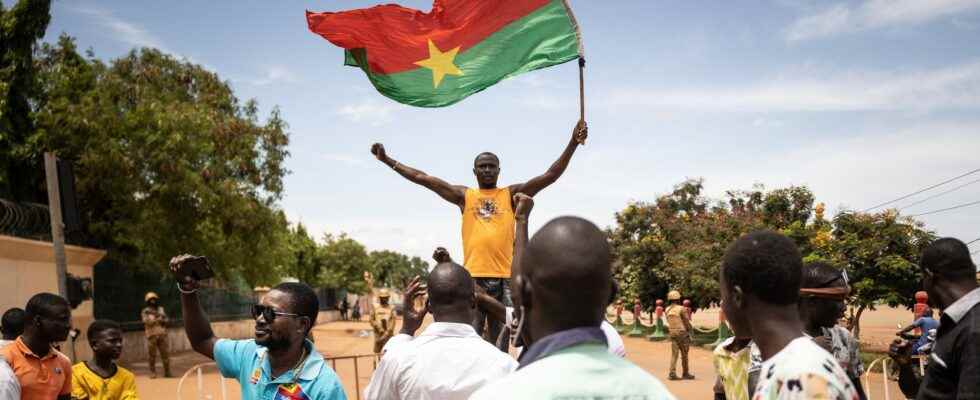Soldiers were deployed on Saturday in Ouagadougou after new shootings, a resurgence of tension in the aftermath of a coup d’etat, the second in eight months, which reflects a deep crisis within the army of Burkina, country undermined by the jihadist violence. Lieutenant-Colonel Paul-Henri Sandaogo Damiba, who himself came to power in January by a putsch, was dismissed from his post by soldiers on Friday evening and replaced at the head of the junta by Ibrahim Traoré, a young captain aged 34. year.
A “continuous deterioration of the security situation”
After a quiet night and morning, several witnesses told AFP that they heard a burst of gunfire around the United Nations roundabout in the city center after 11 a.m. (GMT and local). Soldiers then, like Friday, resumed their positions to block the main axes of the city and in particular the district of Ouaga 2000 which notably houses the presidency, and helicopters flew over the city center, according to an AFP journalist. Traders who had reopened their shops on Saturday morning when calm had returned closed shop and rushed to leave the city center.
Friday evening, after a day peppered with shooting in the district of the presidency in Ouagadougou, about fifteen soldiers in fatigues and for some hooded spoke, shortly before 8:00 p.m. (GMT and local) on the set of national radio and television. They removed from office Colonel Damiba – whose fate remained unknown on Saturday – and announced the closure of land and air borders as well as the suspension of the Constitution and the dissolution of the government and the Transitional Legislative Assembly. A curfew has also been put in place from 9 p.m. to 5 a.m.
The soldiers invoke “the continuous deterioration of the security situation” in the country. The new head of the junta, Captain Traoré, was until now the corps commander of the Kaya artillery regiment, in the north of the country, particularly affected by jihadist attacks. According to several security sources, this coup reveals deep disagreements within the army, the elite unit of the “Cobras” deployed in the anti-jihadist fight reproaching in particular President Damiba for not mobilizing all the forces on the ground. .
“These are the same young officers who were already on the maneuvers during the first coup in January. It is an intramural coup. Damiba was let go by his base who felt betrayed. Things will have to be refocused on the anti-jihadist fight”, deciphers the political analyst Drissa Traoré.
The European Union denounces and condemns this coup
In the streets on Saturday morning, several residents welcomed this new putsch in a rather positive way. “Damiba has failed. Since he came to power, areas that were at peace have been besieged. He took power, then he betrayed us,” said Habibata Rouamba, a trader and civil society activist. “On the security level, nothing is going well, there are no results. Since Damiba took power, it has only gotten worse”, abounds Honoré Yonli, an official of an organization of young entrepreneurs.
The international community was much less enthusiastic. As of Friday evening, the Economic Community of West African States (ECOWAS) – whose authorities Burkina has been suspended from since the January coup – “condemned in the strongest terms the seizure of power by the force which has just taken place”. ECOWAS finds “this new coup de force inopportune at a time when progress has been made (…) for a return to constitutional order no later than July 1, 2024”.
For the time being, the new putschists have not indicated whether they intend to respect this transition schedule. On Saturday, the Chairperson of the African Union (AU) Commission, Chadian Moussa Faki Mahamat, condemned “the unconstitutional change of government” and also called for a return to constitutional order by July 2024.
The head of European diplomacy Josep Borrell for his part considered that this coup “endangers the efforts undertaken for several months” on the subject of the transition.
More and more Russian supporters
The presence of Russian flags in a demonstration of several hundred people on Friday afternoon to demand the departure of Sandaogo Damiba also raised questions about Moscow’s influence in this new putsch. “It is obvious that the Russian partisans are more and more numerous. Within the army and the populations, voices are rising to ask for a partnership with Russia. But this remains at the stage of theory. We must not expect a break with France but perhaps more cooperation with other partners such as Russia”, tempers analyst Drissa Traoré.
Colonel Damiba had come to power in January in a coup that overthrew President Roch Marc Christian Kaboré, discredited by the increase in violence. But in recent months, attacks hitting dozens of civilians and soldiers have multiplied in the north and east, where cities are now under blockade by jihadists, who blow up bridges with dynamite and attack convoys supplies circulating in the area.
Since 2015, recurrent attacks by armed movements affiliated with the jihadists of Al-Qaeda and the Islamic State group, mainly in the north and east of the country, have claimed thousands of lives and caused the displacement of some two million people. . With the two putsches in Mali in August 2020 and May 2021 and that in Guinea in September 2021, this is the fifth coup in West Africa since 2020.
